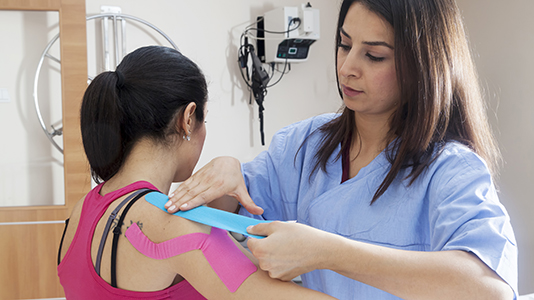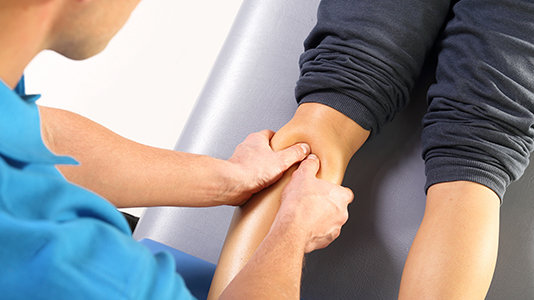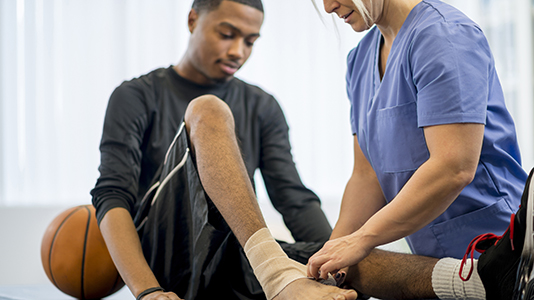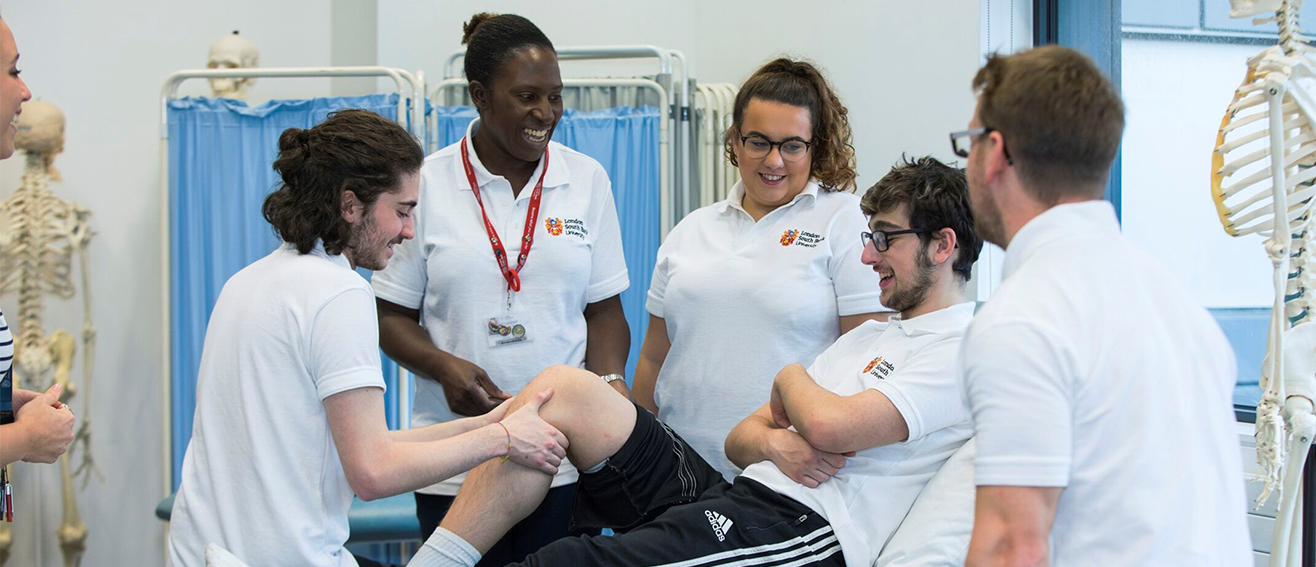Overview
This course is closed for new applications for September 2024 entry. You might be interested in the BSc degree, Chiropractic, or other Allied Health options.
Become a healthcare practitioner in musculoskeletal injuries
Gain the skills and knowledge to become a registered member of the British Association of Sport Rehabilitators (BASRaT) and work as a Graduate Sport Rehabilitator (GSR).
This course will prepare you to become an autonomous healthcare practitioner specialising in assessment, diagnosis, and treatment of a range of musculoskeletal injuries and diseases, from early-stage to late-stage rehabilitation and return to sport and occupation, in both the general population and athletes
You will also be trained to be first response practitioner working pitch-side at sporting events, and to design, prescribe and implement exercise programmes for injury prevention and performance enhancement in populations with injury, illness and disease.
Our School of Allied and Community Health within the Institute of Health and Social Care is one of the largest in the country, enabling you to study in a state-of-the-art environment within a wide and supportive network. There are also a number of opportunities available within this course, such as the chance to undertake the Level 2 Pre-Hospital Immediate Care in Sport Course (PHICIS), accredited by the Rugby Football Union (RFU).
 |  |  |
Why Sport Rehabilitation at LSBU?
- mortar-board
- Accredited by the British Association of Sport Rehabilitators (BASRaT), the UK regulator and professional body for Graduate Sport Rehabilitators.
- medkit
- Includes the RFU Pre-Hospital Immediate Care in Sport (PHICIS) Level 2, leading to a recognised qualification to work pitch-side in elite sport and events.
- heartbeat
- Learn from expert staff who are in current practice in the NHS and elite-level professional sport with expertise in sports medicine.
- clinic-medical
- Gain clinical experience with our placement partners across London, and in our state-of-the-art in-house injury clinic.
- user-md
- Become a team player and study alongside health care profession courses, in the Division of Physiotherapy, Sport Rehabilitation and Chiropractic, to the highest standard of professionalism
- rocket
- LSBU Health and Social Care graduates are the second highest paid amongst all London Modern university graduates, and the sixth highest in the UK one year after graduating (DfE LEO data 2022).
| ModeFull-time | Duration2 years | Start dateSeptember | Application codeC633 | Application method UCAS |
Watch our video to see how you can make yourself at home studying at LSBU.
Location
London South Bank University student union is located at 103 Borough Rd, London SE1 0AA.
If you are visiting our Southwark Campus, you may wish to use our downloadable campus map (PNG File 466 KB). For information on accessibility, see our DisabledGo access guides. See our location page for more details.
Entry Level Requirements
Need further information? Call us on 0800 923 8888 to discuss entry requirements.
- Sport and Exercise science
- Sports Coaching
- Sports Psychology
- Strength and Conditioning
- Sports Therapy
- Physical Education
- Health and Physical Activity
- Physiotherapy
- Osteopathy
- Chiropractic
To qualify for admission, students will normally be expected to have achieved a 2:1 or a good 2:2 honours degree in one of the following disciplines:
Additional requirements
In addition, applications will also be considered from students with a 2:1 or a good 2:2 degree in one of the following:
- Biology
- Anatomy
- Physiology
- Occupational therapy
Applications will also be considered from individuals with a degree in other allied healthcare professional fields including but not limited to nursing, radiography, health promotion, health and exercise. Applicants based on relevant work experience within the industry as detailed in a personal statement will also be considered. This may include voluntary work, coaching, personal training or shadowing. All students will be considered on an individual basis.
If an applicant is shortlisted, they will be invited to complete an interview. The interview panel will might consist of LSBU staff, lecturers, service users and clinicians.
The admission and selection procedures outlined are based on the following principles:
- Fitness to practice
- Personal statement
- An imperative to ensure flexibility of entry
- The course team’s commitment to facilitate equal opportunities at the point of entry and throughout the course
The university operates an equal opportunities policy where there is no discrimination in view of age, gender, race, marital status, sexual orientation, socio-economic background, disability or religious beliefs.
All offers of places on the course are conditionally based on:
- Satisfactory outcome of an interview;
- Occupational Health clearance;
- Satisfactory outcome of an Enhanced Disclosure and Barring Service (DBS) check
Applications from candidates with disabilities are considered and assessment of abilities and needs undertaken sensitively. The safety of the potential students is an important consideration.
All applicants must be 18 years or over at the commencement of the course.
English Language Requirement
Students for whom English is not their first language must achieve a minimum score of 6.5 overall or equivalent (including 7.0 in written element and a minimum score of 6.5 in speaking, reading and listening element) for the International English Language Test Score (IELTS)
Credit Accumulation & Transfer and Accreditation of Prior Learning
Students will not be considered for Accreditation of Prior Learning (APL) as per the new guidelines set out by BASRaT in 2014. APL will only be considered by the programme if the student in question has completed a module on another BASRaT accredited course. Any considerations on APL will be made in conjunction with the Course Director and BASRaT directly.
Choose your country
Select country here:
Missing English and Maths qualifications?
If you do not have the required English and Maths qualifications needed to satisfy the entry requirements for this programme, we have courses available at our partner College that you can take to upskill in these areas. Find out more at South Bank College.
For more information, including how and when to pay, see our fees and funding section for postgraduate students.
See our Tuition Fees Regulations (PDF File 391 KB) and Refund Policy (PDF File 775 KB).
Possible fee changes
The University reserves the right to increase its fees in line with changes to legislation, regulation and any government guidance or decisions.
The fees for international students are reviewed annually and the University reserves the right to increase the tuition fees in line with the RPIX measure of inflation up to 4 per cent.
Postgraduate loan (PGL) for Masters study
If you are starting a Masters course, studying either full- or part-time, you may be entitled to apply for a postgraduate study loan. Find out more at our postgraduate fees and funding section.
Scholarships
We offer several types of fee reduction through our scholarships and bursaries. Find the full list and other useful information on funding your studies on the scholarships and fee discounts page.
Fee status
Please check your fee status and whether you are considered a Home, EU or International student for fee-paying purposes and for our regulatory returns, by reading the UKCISA regulations.
The writing up fee:
A student can change to writing up status for the purpose of a lower fee when the examination arrangements have been submitted and approved. Examination arrangements are submitted 3 months prior to submission of the thesis for examination. A student only has one year of writing up at the reduced fee that covers submission, viva, and minor corrections. The writing up fee 25/26 is £1,246
International students
The course is not currently open to international students.
International (non Home) applicants should follow our international how to apply guide.
Home and International entry
| Mode Full-time | Duration 2 years | Start date September | Application code C633 | Application method UCAS |
Postgraduate students and research students should apply through our dedicated application system. Full details of how to do this are supplied on our How to apply section for postgraduate students and our How to apply section for research students.
See our admissions policy (PDF File 1,043 KB) and complaints policy (PDF File 516 KB).
Accommodation
Students should apply for accommodation at London South Bank University (LSBU) as soon as possible, once we have made an offer of a place on one of our academic courses. Read more about applying for accommodation at LSBU.
Finance
It's a good idea to think about how you'll pay university tuition and maintenance costs while you're still applying for a place to study. Remember – you don't need to wait for a confirmed place on a course to start applying for student finance. Read how to pay your fees as a postgraduate student.
Preparatory reading
These publicly available materials provide some excellent preparation for your course, giving insight into the Sport Rehabilitation profession and some key concepts for developing into a qualified healthcare professional.
- Standring S. (2020) Gray’s Anatomy: The anatomical basis of clinical practice. Elsevier.
- Brukner & Khan’s (2017) Clinical Sports Medicine: Injuries, Vol 1. McGraw-Hill Education.
- Hattam P., Smeatham A. (2020) Musculoskeletal examination: an evidence-based guide for clinicians.
- Neumann DA. (2016) Kinesiology of the Musculoskeletal system: Foundations for Rehabilitation. Elsevier.
- Silverthorn D. (2018) Human Physiology: An integrated approach. Pearson.
- Haff GG., Triplett NT. (2015) Essentials of strength training and conditioning. National Strength and Conditioning Association
Follow us on Twitter: @SportRehabLSBU1
Prepare to start
We help our students prepare for university even before the semester starts. To find out when you should apply for your LSBU accommodation or student finance read the How to apply tab for this course.
Enrolment
Before you start your course we’ll send you information on what you’ll need to do before you arrive and during your first few days on campus. You can read about the process on our Enrolment pages.
The programme is designed to build theory and knowledge across the range of contemporary musculoskeletal and sports medicine and rehabilitation environments. Integration of knowledge and practice underpins all of the core modules, with specific specialist knowledge and skills being developed throughout the 2-year full-time course.
Year 1
- Clinical Anatomy, Physiology and Pathophysiology
This module aims to provide students with a comprehensive and in-depth knowledge and understanding of the structure, function of the human body and the musculoskeletal system. - Clinical Assessment and Neuromusculoskeletal Injuries
The module aims to provide students with a deep and systematic understanding of comprehensive medical history taking along with a series of the most common neuromusculoskeletal injuries and the clinical assessment techniques used to evaluate them. - Research Skills for Allied Health
The purpose of this module is to consolidate and extend students' knowledge of research approaches and methods and enhance their ability to be critical users of research evidence. - Clinical and Therapeutic Treatment Modalities
This module aims to develop the student’s understanding and ability to provide therapeutic techniques used in the treatment of acute and chronic neuromusculoskeletal injuries. - Evidence-based Practice and Clinical Placement 1
This module provides an opportunity for students to gain essential practice-based experience. It also aims to provide students with theoretical and practical knowledge on clinical population, para-sports, psychology of injuries, and diagnostic ultrasound.
Year 2
- Applied Biomechanics and Rehabilitation
The aim of this module is to develop further the practical skills required for assessment of human motion and rehabilitation of common neuromusculoskeletal injuries. - Sport Rehabilitation and Conditioning
In this module, students will develop skills for the optimisation of rehabilitation programmes and interventions by considering methodologies, approaches to screening, training programme design and performance enhancement. - Dissertation for Sport Rehabilitation
The aim of this module is to enable students to write a master’s level dissertation demonstrating an advanced understanding of the process of planning, managing and conducting a research project relevant to a chosen topic. - Evidence-based Practice and Clinical Placement 2
This module provides an opportunity for students to gain essential practice-based experience. It also aims to provide students with theoretical and practical knowledge on clinical population, para-sports, psychology of injuries, and diagnostic ultrasound.
Facilities
You’ll benefit from an array of outstanding facilities, providing the perfect environments for you to practice and develop your skills. Some of the facilities you’ll have access to include:
Clinical skills labs
We have a variety of skills labs which replicate real-life work environments, and provide an ideal setting for simulation learning using the latest technologies. Facilities include adult wards, physiotherapy suite, and critical skills lab.
Human Performance Centre
Equipped with modern technology, the Human Performance Centre enables word class research in the fields of sport, health, physical activity and exercise science.
LSBU Active
You'll have access to a range of sports facilities and equipment, including a fully equipped fitness suite with SMART Centre Technology, a Functional Training Zone, Free Weights Room and Sports Hall.
You can explore these facilities further, including viewing virtual tours of some of the areas, by selecting the links above.
Careers
Employability Service
We are University of the Year for Graduate Employment for the second year in a row - The Times and Sunday Times Good University Guide 2018, 2019.
At LSBU, we want to set you up for a successful career. During your studies – and for two years after you graduate – you’ll have access to our Employability Service, which includes:
- An online board where you can see a wide range of placements: part-time, full-time or voluntary. You can also drop in to see our Job Shop advisers, who are always available to help you take the next step in your search.
- Our Careers Gym offering group workshops on CVs, interview techniques and finding work experience, as well as regular presentations from employers across a range of sectors.
Our Student Enterprise team can also help you start your own business and develop valuable entrepreneurial skills.
Successful completion of the MSc (pre-registration) Sport Rehabilitation course (Level 7 – 180 credits) as well as a minimum of 400 clinical placement hours will confer eligibility for BASRaT Registration as a Graduate Sport Rehabilitator.
Graduates of this course will be able to look for roles in a range of environments including sports injury clinics; amateur, academy and professional sports clubs; health, fitness clubs and gyms; rehabilitation units; the military, NHS and private practice; sports massage; or one-to-one and group exercise instruction. Graduates of this course will also be able to pursue further studies in education, research or undertake further training in healthcare, sports or business disciplines.
The course is accredited by the British Association of Sport Rehabilitators (BASRaT), the UK regulator and professional body for Graduate Sport Rehabilitators (GSR), who hold an Accredited Professional Register approved by the Professional Standards Authority for Health and Social Care (PSA) in the UK.
Upon successful completion of your degree programme, you will be able to apply for Professional Membership of BASRaT subject to meeting the prerequisite eligibility criteria set by the professional body.
BASRaT provides full professional liability insurance to all Professional Members, enabling you to practice as a Graduate Sport Rehabilitator and use the GSR title.
- The British Association of Sport Rehabilitators and Trainers (BASRaT) is the UK regulator for Sport Rehabilitation Graduates. BASRaT ensures that all accredited courses are of a high equitable standard and that all graduates conform to a strict code of professional practice and conduct.
The course also incorporates the Rugby Football Union (RFU) Pre-Hospital Immediate Care in Sport (PHICIS) Level 2.
Placements
As part of the programme, you will complete 400 hours of clinical placement. The 400 hours of placement experience is in line with BASRaT requirements for accredited courses.
Applied practical placements will be sourced in a number of ways. First, London South Bank University has a broad network of educational placement providers in place including private clinics and sports clubs as well as the on-site LSBU Sport Rehabilitation which will be used to support students. Alongside this, students will be encouraged to seek individually source opportunities through personal contact.
You may be required to undertake these either in one block of full-time work (4 or 6 weeks) or part-time over the full academic year. It may be necessary to live out or travel daily. Placement sites could be up to 1.5 hours travel from a home address (or friend/family students could stay with), however, we do our best to ensure that no student does more than their fair share of travelling or living out. Placements could also operate outside normal working hours (e.g. evenings, weekends, and bank holidays).
Placement locations currently include:
- Fulham FC
- Neurokinex
- Vita Health Group NHS
- Bromley FC
- Borehamwood FC
- Form Clinic
- The Running School
- Spectrum Physio
- Welling United FC
- Uplands Care Centre
- Aquatic Rehabilitation Exercise Academy – Hydrotherapy
Students will also have the opportunity to complete our unique Teaching/Educational Placement, within our programme.
Teaching and Assessment
This course takes a blended approach to learning. It provides a range of learning formats and teaching delivery styles – and allows an individual approach, providing you with some flexibility in your preferred learning style.
Interactive lectures will introduce key subject matter. Practical sessions, small group teaching and demonstrations will be used to facilitate skills development.
A range of other approaches will be incorporated into students’ learning which can include online worksheets, guided independent study, e-learning, peer group learning, and group discussions.
When it comes to assessment, we use a variety of approaches to promote different skills and abilities while reflecting the nature of the module of learning. The main rationale for choosing the assessment method is helping students in the development of a wide range of professional knowledge and skills. The types of assignments demonstrate progression of skills and abilities as students’ progress on the course. Typical assessments include written examinations, written assignments, verbal (case study) presentation, practical examination and clinical assessments.
Personal tutoring
As a Health and Social Care student, you will be allocated a named tutor during your first three weeks at LSBU. The role of your tutor is to be your primary contact for academic and professional development support.
Your tutor will support you to get the most of your time at LSBU, providing advice and signposting to other sources of support in the University. They should be the first person at the university that you speak to if you are having any difficulties that are affecting your work. These could be academic, financial, health-related or another type of problem.
You will have appointments with your personal tutor at least once a semester throughout your course.




